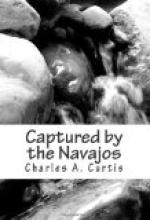Busy putting stops into the windows, and fastening them and the doors, we could do nothing to extinguish the fire before it got well under way.
A blanket was thrown over the top of the chimney to prevent a draught, and soon the whole interior was thick with stifling smoke.
The horses plunged frantically, sending the fire in every direction. Our eyes began to smart painfully, and we felt ourselves suffocating and choking in the thick and poisonous atmosphere.
To remain in the house was to be burned alive; to leave it was to perish, perhaps, in a still more horrible way. Just as I was on the brink of despair, the sergeant gasped rather than spoke:
“They are here, lieutenant. Hark! Hark!”
Ping! Ping! We heard the sound of rifle-shots, accompanied by a good, honest, Anglo-Saxon cheer. Was there ever sweeter music?
The war-whoops ceased, the blanket was quickly withdrawn from the chimney-top, and two thuds on the east side of the cabin showed the Indians had left the roof. A general scurrying of feet and other thuds down the perpendicular wall back of the spring were evidence that the besiegers were in full and demoralized flight.
We threw the doors open, and our friends rushed in, and before a greeting was uttered feet and butts of rifles were sweeping brands and straw into the fireplace, and the roaring draught was fast clearing the air.
Before I had fairly recovered my sight, and while still engaged in wiping away the tears the smoke had excited to copious flow, I heard a sobbing voice near me say:
“Oh, Franky, brother, if it had not been for dear little Vicky what would have happened to you?”
Blinking my eyes open, I saw the boy corporals with their right arms about each other’s neck, holding their Spencers by the muzzles in their left hands.
“Why, Henry,” I said, “you did not make that march with the men?”
“Couldn’t keep him back, sir,” answered Corporal Coffey. “Said his place was with his brother. Made the march like a man, and fired the first shot when we turned the bluff.”
We shook hands all round, and then went out to see whether the volleys of the rescuing party had inflicted any punishment upon the Navajos. Two dead Indians lay near the cabin, and farther away the one that had fallen when attempting to remove the obstacle before the log. There were traces of others having been wounded.
A fire was promptly kindled outside the cabin, and we sat about it for a time to rest and enjoy a lunch. The horses had been somewhat singed about the legs, but were not disabled. An hour afterwards Sergeant Cunningham placed Corporal Henry on his pony, Chiquita, and we started for the valleys.
At daybreak the day after we left Jemez we reached camp, and on the evening of the same day the detachment we had left behind for a rest also arrived, without adventure on the march. Cordova and his son at once set out on the trail of the Navajos, whom we reported to be in possession of their animals, to ascertain why they were in our vicinity.




